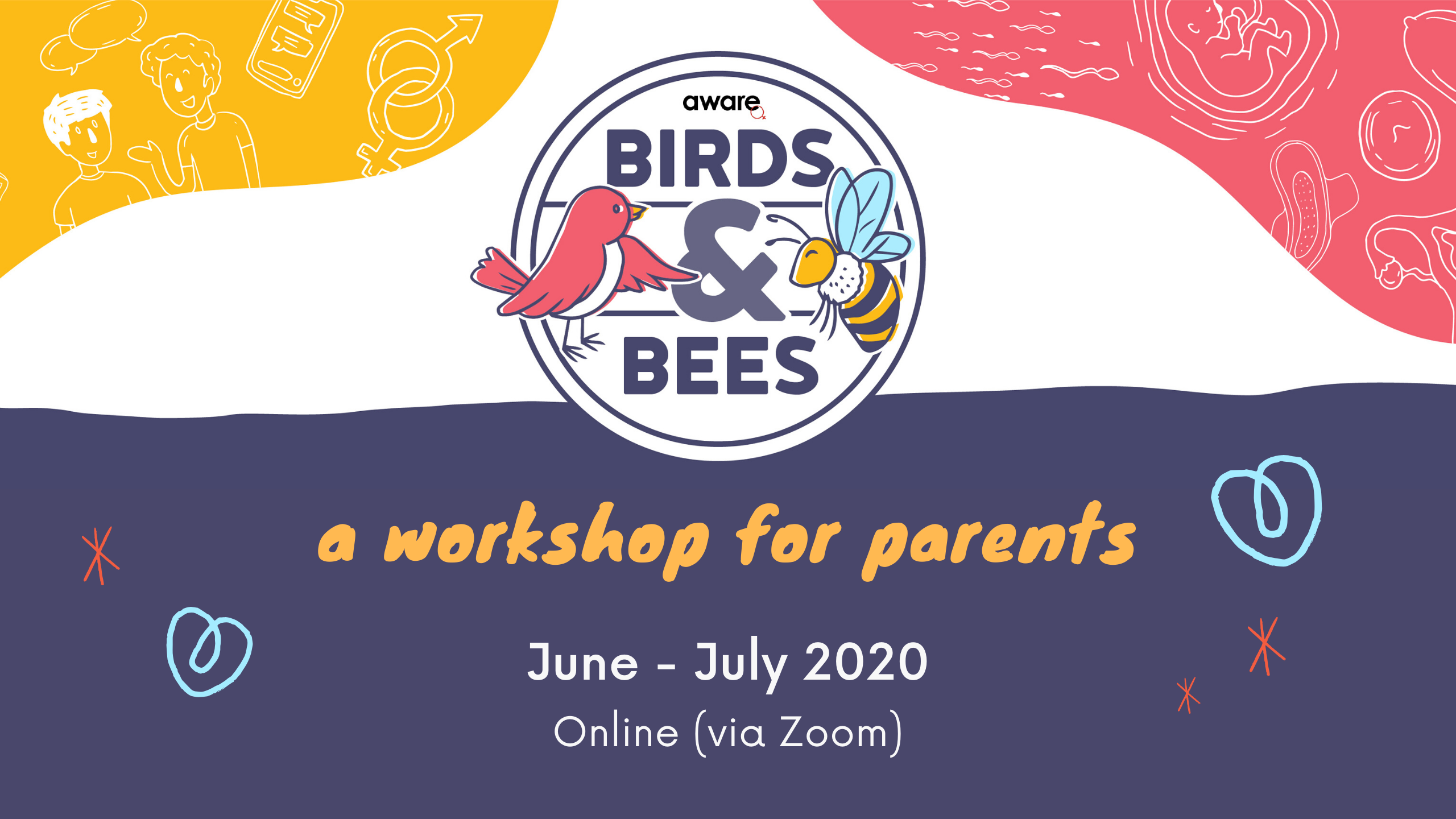-
Advocacy Theme
-
Tags
- Abortion
- Adoption
- Caregiving
- CEDAW
- Disability
- Domestic Violence
- Domestic Workers
- Harassment
- Healthcare
- Housing
- International/Regional Work
- Maintenance
- Media
- Migrant Spouses
- Migrant Workers
- Muslim Law
- National budget
- Parental Leave
- Parenthood
- Polygamy
- Population
- Race and religion
- Sexual Violence
- Sexuality Education
- Single Parents
- Social Support
- Sterilisation
- Women's Charter
A Recap: Birds & Bees, an (online) workshop for parents about sex education
August 25th, 2020 | Children and Young People, News, Sexual and Reproductive Health
written by Mahi Nair
Birds & Bees is a workshop that engages parents on topics related to sexual health and relationships, so as to equip them to better communicate with their children about sexual education. The workshop is conducted by facilitators Tan Joo Hymn, a storyteller, teacher and a longtime AWARE member; Mathangi Kumar, an ESOL teacher and counsellor; and Lee Yi Ting, a former Ministry of Education sex-ed facilitator and active advocate for sexual health and sexuality education in Singapore.
Previous editions of the Birds & Bees workshops were conducted in person. However as of June 2020, workshops are held online via Zoom. This workshop was conducted online across three sessions, each session lasting for 1.5 hours. Sessions were purposefully kept small, with fewer than 12 participants, to allow more time for discussion and sharing.
During the first session, participants were split up into smaller discussion groups to talk about the sex education that they themselves had received in their youth. Many parents shared that their sex education had been minimal, or that it had felt awkward, overly scientific or out of touch. Some found it to be uninformative or simply incorrect, with little variety or practical explanations of sexuality and sexual health. Parents expressed regret that comprehensive sex ed had not been taught to them.
All the parents agreed on one thing: They wished that they had been taught more formally about sexual health and exploration. They thought it important to teach sex education from a place of respect and love—for their own bodies and for others’.
The first session covered consent, while the second session focused on being an “ask-able” parent—i.e. being approachable and open, so as to encourage their children to confide in them. The third and final session touched on healthy versus unhealthy relationships, as well as sexual assault. The sessions also went in depth on how to have effective and healthy communication to broach these potentially uncomfortable or controversial topics.
The facilitators highlighted how communication is a two-way process. Parents have to remain empathetic and open-minded in order to effectively converse with their children, through sharing personal stories and active-listening.
At the end of the first session, the facilitators give the parents “homework”, which involved observing how they interacted with their children throughout the week, and identifying parts of their speech that could be improved upon for more effective communication. This included watching out for their own habits—were they giving instructions and scolding, or participating in active listening and response?
During the sharing session the following week, some reflected that they were used to scolding and giving instructions, which offered little space for their child to voice out their own feelings and thoughts. Noticing these patterns helped parents to identify which areas they needed to work upon: One parent shared that after reflecting upon their own communication style, they realised that it had to change. This led to implementing a more listening-focused stance when communicating with their child, rather than telling their child what to do.
Collectively, the parents agreed that topics like one’s own sexuality and safe sex practices were in fact awkward to bring up with their children (sentiments that corresponded with the findings of a recent survey by AWARE and Blackbox). Many felt that it was difficult to have these conversations abruptly, despite understanding their importance.
Accordingly, a significant takeaway from the workshop was that communication about awkward topics is not “one big talk”, but rather many micro conversations. For example, Joo Hymn suggested dropping small casual hints during daily conversations, like mentioning a scene from a movie that you watched together with your child, and then asking them their opinion on it. This technique allowed Joo Hymn to start a dialogue about an awkward topic with her child, while avoiding an uncomfortable or embarrassing confrontational moment.
It is important to acknowledge that when speaking about difficult or emotional topics, such as LGBTQ issues, pornography and consent, both parent and child might be feeling fearful and judged. However, it is important to talk to one’s child about these things regardless, and take steps towards normalising healthy, open conversations.
The next run of Birds & Bees takes place on 27 August, 3 September and 10 September 2020. Get your tickets now.




